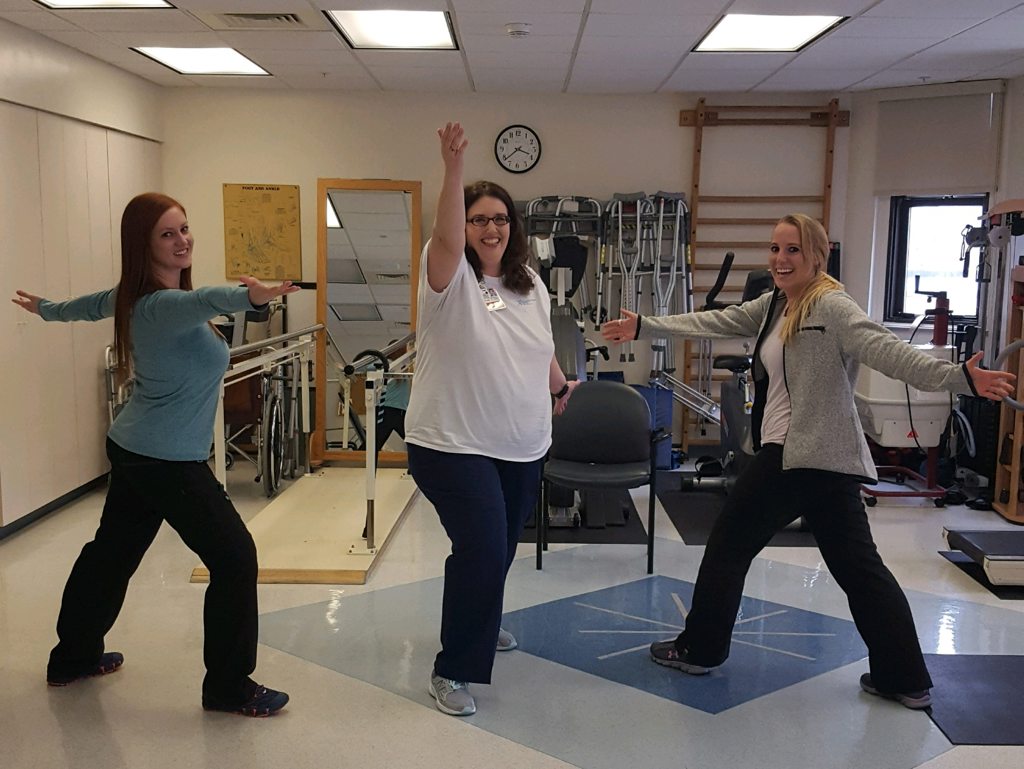
Helping Patients with Parkinson’s Move Big and Speak Loud
To most people, balancing while using a snow blower or talking on the phone to a family member is a task that happens on autopilot, but for patients with Parkinson's disease, these everyday undertakings can present a monumental challenge.
Parkinson’s is a disorder that affects certain nerve cells in the brain. The disease can impact an individual’s mobility because it causes tremors, muscles stiffness, slowed movement and loss of automatic movement. It also can hinder individuals’ abilities to speak – their voice may get softer, sound hoarse or monotone, their speech may be slurred and they can have trouble finding the right words; all of this can make it difficult for others to hear them.
The disease slowly gets worse over time, generally over many years. However, there are treatments that can help individuals with Parkinson’s live a full life.
According to Nicole McMillen, occupational therapist at Penn Highlands Clearfield, The Lee Silverman Voice Treatment, or LSVT, therapies are intense treatment protocols offered by The Rehabilitation Center of Penn Highlands Healthcare to help slow the decline of motor and speech skills and improve the quality of life in patients with Parkinson’s.
LSVT originally was developed to treat speech disorders in individuals with Parkinson’s and other neurological conditions and later was expanded to improve limb movement, McMillen said. There are two types of LSVT, LOUD and BIG.
LSVT LOUD helps a patient speak louder and more clearly in all aspects of life, including in interactions with family and at work or social settings, according to Kali Carnovale, speech therapist at Penn Highlands Elk.
“Most people with Parkinson’s struggle to get their voice out loudly enough. It’s not only that their voice gets softer, it’s that the patient’s sensory system is affected, too. So when they hear themselves speaking, they feel like they are screaming, but, in reality, they are actually speaking very softly,” Carnovale said. “LOUD helps to recalibrate the sensory system.”
LSVT LOUD is offered at Penn Highlands Clearfield and at Penn Highlands Elk. The program is completed four days a week for four weeks with additional days as needed, according to Jessica Turner, speech therapist at Penn Highlands Clearfield.
“By stimulating the muscles of the voice box and speech mechanism, the treatment brings the voice to an improved, healthy vocal loudness without strain,” Turner said.
The treatment involves vocal exercises using special software that helps a patient to see their actual speech levels on a computer. Patients also have daily homework, such as reading out loud. In addition to speech, the treatment also can improve swallowing.
“Even though it is so intensive, the results are amazing,” Carnovale said. “For four weeks, you can change your whole life.”
LSVT LOUD also can be combined with LSVT BIG, which is a physical and occupational therapy program that uses specific exercises involving large amplitude and exaggerated movement patterns, which lead to smoother, bigger, safer movements and an improved quality of life, according to McMillen.
“The goal with LSVT BIG is for patients to use their big movements in everyday tasks,” she said. “Many patients with Parkinson’s think they already are making large movements, such as when reaching for a glass, so at first they can feel a little silly because they feel like they’re make exaggerated motions. But the treatment is actually reeducating their brain to think big.”
LSVT BIG also is completed four days a week for four weeks with additional days as needed.
In addition to those with Parkinson’s, individuals with progressive supranuclear palsy, Shy-Drager syndrome and multi-system atrophy may benefit from LSVT BIG, McMillen said.
“This treatment can truly be life-changing for patients,” she said. “It can help them regain the ability to do everyday tasks that we so often take for granted.”
For more information, contact The Rehabilitation Center at Penn Highlands Clearfield, which offers LSVT BIG and LOUD, at 814-768-2285 or The Rehabilitation Center at Penn Highlands Elk, which offers LSVT LOUD, at 814-788-8490 or visit www.phhealthcare.org/rehab.
In addition, if you or a loved one suffers from Parkinson’s, a support group is offered the third Wednesday of every month from 1 to 2:30 p.m. in the Day Room of The Rehabilitation Center inpatient unit on the fifth floor of Penn Highlands DuBois.
The group is free to attend and open to anyone with Parkinson’s and/or to anyone who is a family member or caregiver of someone with Parkinson’s. The meetings, sponsored by The Rehabilitation Center of Penn Highlands DuBois, consist of education, personal stories and social time. For questions or more information, please call the Outpatient Rehabilitation Center at 814-375-3372.
